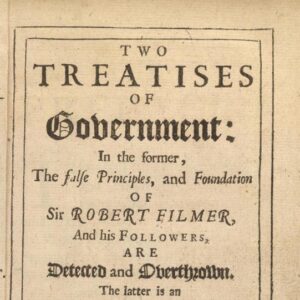John Locke’s Two Treatises of Government is a political philosophy work from 1689. It belongs among the most notable and valuable books in political science.
During the life of this English philosopher, England was in turmoil. His father took part in the Civil war, which eventually led to the fall of the monarchy. And, the period between 1653 and 1659 was of the Protectorate, a somewhat republic.
However, in 1660, King Charles II restored the monarchy. In 1675, the king forced Anthony Ashley Cooper, 1st Earl of Shaftesbury, with John Locke, out of the monarchy. Locke only returned after the 1688 Glorious revolution when William II. became king.

These events and the relationship with the Earl of Shaftesbury are the underlying factors for Locke’s philosophy in the Two Treatises of Government. Besides, he influenced countless future philosophers such as Jean-Jacques Rousseau, James Madison, Samuel Adams, Alexander Hamilton, Thomas Paine, and more.
First Treatise of Government
In summary, Locke criticizes the book “Patriarcha.” Robert Filmer, the author of this work, advocates for the divine rights of the king. That is the idea that monarchs derive their authority from God. It says that they obtain their rights as descendants of Adam.
However, Locke resolutely rejects this concept. He sees no Biblical evidence for the divine and absolute authority of monarchs. Besides, nobody knows who are the genuine and direct descendants of Adam.
Second Treatise of Government
John Locke bases the Second Treatise on two concepts. First, it is natural rights. Thus, the right to live and act freely as long as it does not interfere with the first right. And also the right of private ownership.
Secondly, he discusses the theory of the social contract. Unlike Thomas Hobbes, he does not view the state of nature as chaotic and harmful. He believes that a moral compass bounds people. And therefore, they would not hurt each other. They agree to a social contract to overcome certain deficiencies of the natural state. For example, liberty and private ownership are benefits of the contract.
